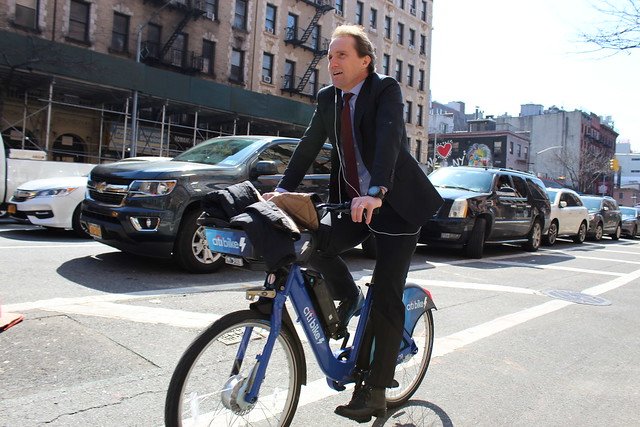Report: Citi Bike Is Leaving Behind Poor Communities Of Color
July 10, 2019, 3:45 p.m.
Citi Bike is predominantly catering to wealthy, white New Yorkers, while leaving behind low-income residents and communities of color, according to a new study out of McGill University.

Citi Bike is predominantly serving wealthy, white New Yorkers, while leaving behind low-income residents and communities of color, according to a new study out of McGill University.
The report, which was funded by New York Communities for Change (NYCC), looked at publicly available data on the city's primary bike share system. It found that New Yorkers living inside Citi Bike's service area have a median household income of $90,400, compared to an average of $54,700 for those excluded.
According to the study, more than 75 percent of neighborhoods that experience extreme poverty lie outside Citi Bike's service area, and only 16.5 percent of people of color have access to any of the city's bike sharing services.
The blame for these disparities ultimately rests with Mayor Bill de Blasio's Department of Transportation, which makes the final decisions about station placement. Reached for comment, DOT spokesperson Alana Morales highlighted recent expansions in Harlem, Red Hook, and Bushwick, adding that it was "operationally important" for the initial launch to occur in dense areas of Manhattan and Brooklyn.
Still, six years after Citi Bike arrived in New York, three quarters of city residents don't have any access to bike share, and those that do tend to be richer, whiter, and already close to transit options. Of the 2.5 million city residents who live more than half a mile from a subway station, less than four percent have access to Citi Bike stations.
"This report shows Citi Bike has failed to bring bike sharing to the parts of the City that can use it most—communities of color, low-income neighborhoods and people living in transit deserts," said Jonathan Westin, executive director at NYCC, in a statement. "The City has to take a serious look at what a company that has been operating with a virtual monopoly has been doing and move quickly to fix it."
(NYCC has previously received at least one donation from Lime, a Citi Bike competitor that currently operates a dockless bike share pilot program in Staten Island and the Rockaways; a spokesperson for NYCC would not immediately disclose the amount of the contribution, but denied that it factored into their decision to commission the study. A spokesperson for Lime did not respond to Gothamist's inquiries).
As part of the initial contract, Citi Bike has exclusive rights to all areas it operates—which currently includes most of Manhattan, portions of Brooklyn, and a small sliver of Western Queens—so long as at least 12,000 bikes remain on the street (which is not always the case). There were talks of expanding into the Bronx and Staten Island in recent years, but those have stalled.
This past winter, following Lyft's purchase of Citi Bike, the company announced that they would be doubling their service area and more than tripling the size of the fleet in the next five years.
The timing and placement of that expansion has not yet been announced. A spokesperson for Lyft told Gothamist, "As we expand significantly in the near future, we will reach many more neighborhoods and continue our focus on bike share equity."
The spokesperson also pointed out that Reduced Fare Bike Share, which offers discounted Citi Bikes to New Yorkers on SNAP assistance or in NYCHA, has seen a 55 percent increase in membership, and now has over 3,000 active members.
Meanwhile, transit advocates have long noted the lack of public funding for bike share, at times criticizing de Blasio for sinking millions of dollars into his ferry initiative without allocating any money for Citi Bike. (Per one estimate, the 2018 ferry subsidy would've paid for nearly 200,000 annual Citi Bike memberships.)
But according to David Wachsmuth, the report's author and head of the Urban Politics and Governance research group at McGill University, Citi Bike's "municipal monopoly" means it should be evaluated along the same standards as any other public service, even if it remains a private entity.
"It's appropriate to say that it's effectively a public service, and it doesn't live up to the standard well," he told Gothamist. "The city should be demanding a different service than the one it's getting—whether that's for Citi Bike to provide or its competitors, I'm not sure."